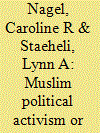|
|
|
Sort Order |
|
|
|
Items / Page
|
|
|
|
|
|
|
| Srl | Item |
| 1 |
ID:
181313


|
|
|
|
|
| Summary/Abstract |
Whether addressing violent ethno-nationalism, xenophobic bigotry, or religious intolerance, scholars and educators invoke cosmopolitan notions of a shared planet and common humanity as a means of rising above difference. Cosmopolitanism as an ethical and political orientation places an imperative on seeking out, welcoming, and learning from cultural others. As such, cosmopolitanism involves a process of reducing the social and physical proximity between ‘them’ and ‘us’ carried out in the belief in shared commonalities held by a universal ‘we.’ However, a priori assumptions about who and what constitutes that ‘we’ at the heart of cosmopolitanism are necessarily partial, situated, and subjective. In this special section, authors consider the tensions, paradoxes, and potentials of cosmopolitanism in diverse settings and from diverse perspectives. Specifically, these papers examine the formation of youthful, cosmopolitan subjectivities and youth involvement in the creation of cosmopolitan spaces, from South-South global volunteering and international missionary trips to the anti-nationalist hip-hop scene in Sarajevo and efforts to enact a civic cosmopolitanism in Beirut. Situated in post-colonial and post-conflict contexts and centering the political subjectivities of young people and their hopeful efforts to bring about a better world, these papers examine the spatial-temporal politics of cosmopolitanism and the tension inherent in creating necessarily bounded spaces grounded in cosmopolitan openness. This introduction frames this examination of grounded and contested cosmopolitanisms as an immanent process of world-building guided by a transcendent worldviews. This framing emphasizes cosmopolitanism as a universal moral outlook and the need to create caring pluriversal worlds capable of accommodating multiple worldviews.
|
|
|
|
|
|
|
|
|
|
|
|
|
|
|
|
| 2 |
ID:
113891


|
|
|
|
|
| Publication |
2011.
|
| Summary/Abstract |
Scholarship on Muslim political mobilisation in the West has developed as an important counterpoint to public discourse, which has tended to cast Muslims as a threat to social cohesion, liberal democracy, and national security. But even as scholarly literature has shed light on civic participation among Muslims, it has sidelined the diversity of political identities and values that motivate them. Most, if not all, Muslims in the West find their identities politicised in some way, but the question of whether this leads to a consensus amongst Muslims about the role of religion in public life often remains unexamined. In this article we draw on interviews with seventy-eight activists in Britain and the United States who are both Muslim and Arab to complicate ideas about the political mobilisation of Muslims in the West. Respondents, we show, are far from unified in their views on religion as a basis for political action and mobilisation. Some are keen to place Islam squarely in mainstream political spaces; most, however, are insistent that Islam should remain a private faith and identity and that political mobilisation should take place under the aegis of Arabness or other 'secular' identities. Using theoretical perspectives on the public sphere, we explain the complexity of our respondents' political identities and activism. Our overall aim is to broaden perspectives on the ways in which people from Muslim backgrounds participate in public, political life in Western contexts.
|
|
|
|
|
|
|
|
|
|
|
|
|
|
|
|
| 3 |
ID:
181316


|
|
|
|
|
| Summary/Abstract |
By resorting to a single humanity or global citizenship, civil society organisations in Lebanon seek to raise youth above ethno-national and national differences. Youth from different groups, regions or nationalities are pulled-out of their respective milieus and gathered in spaces where they meet, befriend, train and collaborate. While for the duration of workshops and summer camps youth find themselves in a space removed from the many divisions and inequalities so as to see in each other a “shared humanity”, they still need to confront those divisions and inequalities that order their everyday lives when they return. In navigating the many contradictions between their lives and the NGO space, sectarianism and global citizenship, young men and women in Lebanon try to carve out a space from which they can engage with the world. By drawing on the notion of cosmopolitics as the extent of one’s “world” tied to the political claims one makes in relation to others, this paper will explore how a cosmopolitics of citizenship brings into the fore the politics of global citizenship and its promotion in Lebanon.
|
|
|
|
|
|
|
|
|
|
|
|
|
|
|
|
|
|
|
|
|